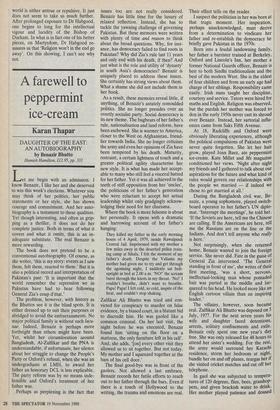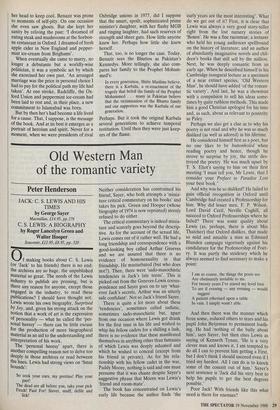A farewell to peppermint ice-cream
Karan Thapar
DAUGHTER OF THE EAST: AN AUTOBIOGRAPHY by Benazir Bhutto
Hamish Hamilton, £12.95, pp. 333
Let me begin with an admission. I know Benazir, I like her and she deserved to win this week's elections. Whatever you may think of her politics, her public statements or her style, she has shown courage and commitment. And her auto- biography is a testament to these qualities. Yet though interesting, and often as grip- ping as a thriller, it does not do her complete justice. Both in terms of what it covers and what it omits, this is an in- adequate substitute. The real Benazir is more rewarding.
The book does not pretend to be a conventional autobiography. Of course, as she writes, 'this is my story: events as I saw them, felt them, reacted to them.' But it is also a political record and interpretation of Pakistan's past: 'It is important that the world remember the repression we in Pakistan have had to bear following General Zia's coup d'etat.'
The problem, however, with history as the Bhuttos see it is the blind spots. It is either dressed up to suit their purposes or abridged to avoid the embarrassments. No major political family is without such lacu- nae. Indeed, Benazir is perhaps more forthright than others might have been. Yet, whilst her circumlocution around Bangladesh, Al-Zulfikar and the PNA is understandable, if unfortunate, her silence about her struggle to change the People's Party or Oxford's refusal, when she was an undergraduate at LMH, to award her father an honorary DCL is less explicable. The party reform was by no means inde- fensible and Oxford's treatment of her father was.
Perhaps as perplexing is the fact that issues too are not really considered. Benazir has little time for the luxury of relaxed reflection. Instead, she has to tackle the yawning challenge of governing Pakistan. But these memoirs were written with plenty of time and reason to think about the broad questions. Why, for inst- ance, has democracy failed to find roots in Pakistan? Why did Zia's rule last 11 years and only end with his death, if then? And just what is the role and utility of 'dynasty' in south Asia's democracies? Benazir is uniquely placed to address these issues. She certainly has strong views about them. What a shame she did not include them in her book.
As a result, these memoirs reveal little, if anything, of Benazir's astutely remoulded politics. She no longer presides over an overtly socialist party. Social democracy is its new theme. The bugbears of her father's rule, nationalisation and land reform, have been eschewed. She is warmer to America, closer to the West on Afghanistan, friend- lier towards India. She no longer criticises the army and even her opinions of Zia have been tempered by his death. Maturity, restraint, a certain lightness of touch and a greater political agility characterise her new style. It is what has made her accept- able to many who still feel a visceral hatred for her father. Yet it was all achieved in the teeth of stiff opposition from her 'uncles', the politicians of her father's generation who were reluctant to accept her actual leadership whilst only grudgingly acknow- ledging their need for her charisma.
Where the book is more fulsome is about her personally. It opens with a dramatic and harrowing account of her father's hanging:
They killed my father in the early morning hours of 4 April, 1979, inside Rawalpindi Central Jail. Imprisoned with my mother a few miles away in the deserted police train- ing camp at Sihala, I felt the moment of my father's death. Despite the Valiums my mother had given me to try and get through the agonising night, I suddenly sat bolt- upright in bed at 2.00 a.m. 'NO!' the scream burst through the knots in my throat. 'No!' I couldn't breathe, didn't want to breathe. Papa! Papa! I felt cold, so cold, inspite of the heat, and couldn't stop shaking.
Zulfikar All Bhutto was tried and con- victed for conspiracy to murder on false evidence, by a biased court, in a blatant bid to discredit him. He was gaoled like a common criminal. On her last visit, the night before he was executed, Benazir found him 'sitting on the floor on a mattress, the only furniture left in his cell'. And, she adds, Ion] every other visit they allowed us to sit together. But not today. My mother and I squeezed together at the bars of his cell door.'
The final good-bye was in front of the gaolers. Not allowed a last embrace, Benazir records her futile efforts to reach out to her father through the bars. Even if there is a touch of Hollywood to the writing, the trauma and emotions are real. Their effect tells on the reader.
I suspect the politician in her was born at that tragic moment. Her inspiration, perhaps unacknowledged, must derive from a determination to vindicate her father and re-establish the democracy he briefly gave Pakistan in the 1970s.
Born into a feudal landowning family, her father a barrister trained at Berkeley, Oxford and Lincoln's Inn, her mother a former National Guards officer, Benazir is heir to both Sindhi traditionalism and the best of the modern West. She is the eldest of four children and from an early age had charge of her siblings. Responsibility came easily. Irish nuns taught her discipline, courtesy and service. Tutors were hired for maths and English. Religion was observed, but the purdah her mother was forced to don in the early 1950s never cast its shroud over Benazir. Instead, her sartorial influ- ences came from Saks Fifth Avenue.
At 18, Radcliffe and Oxford were obviously liberating experiences, although the political compulsions of Pakistan were never quite forgotten. She let her hair grow, played Joan Baez, ate peppermint ice-cream. Kate Millet and Ms magazine conditioned her views. 'Night after night my friends and I gathered to talk about our aspirations for the future and what kind of rules would govern our relationships with the people we married — if indeed we chose to get married at all.'
During the Bangladesh civil war, Be- nazir, a young sophomore, played switch- board operator to her father's UN diplo- mat. 'Interrupt the meetings', he told her. `If the Soviets are here, tell me the Chinese are calling. If the Americans are here, tell me the Russians are on the line or the Indians. And don't tell anyone who really is here.'
Not surprisingly, when she returned home, Benazir wanted to join the foreign service. She never did. Fate in the guise of General Zia intervened. 'The General standing in front of me', she writes of their first meeting, 'was a short, nervous, ineffectual-looking man whose pomaded hair was parted in the middle and lac- quered to his head. He looked more like an English cartoon villain than an inspiring leader.'
The villainy, however, soon became real. Zulfikar Ali Bhutto was deposed on 5 July, 1977. For the next seven years his wife and daughter faced detentions, arrests, solitary confinements and exile. Benazir only spent one new year's day free. She was only released for 48 hours to attend her sister's wedding. For the rest: the army would surround her Karachi residence, storm her bedroom at night, bundle her on and off planes, teargas her if she visited cricket matches and cut off her telephone.
In gaol she was subjected to tempera- tures of 120 degrees, flies, bees, grasshop- pers, and given brackish water to drink. Her mother played patience and doused her head to keep cool. Benazir was prone to moments of self-pity. On one occasion she even saw ghosts. But she kept her sanity by reliving the past: `I dreamed of eating steak and mushrooms at the Sorbon- ne restaurant in Oxford. I dreamed of fresh apple cider in New England and pepper- mint ice-cream from Brighams'.
When eventually she came to marry, no longer a debutante but a worldly-wise politician, it was a symbolic act by which she exorcised her own past. 'An arranged marriage was the price in personal choice I had to pay for the political path my life had taken'. At one stroke, Radcliffe, the Ox- ford Union and peppermint ice-cream had been laid to rest and, in their place, a new commitment to Islamabad was born.
But by then her's had become a life lived for a cause. That, I suppose, is the message of the book. And at its best it emerges as a portrait of heroism and spirit. Never for a moment, when we were presidents of rival Oxbridge unions in 1977, did I suppose that the smart, spoilt, sophisticated prime minister's daughter, with her flashy MGB and ringing laughter, had such reserves of strength and sheer guts. How little anyone knew her. Perhaps how little she knew herself.
That, too, is no longer the case. Today, Benazir sees the Bhuttos as Pakistan's Kennedys. More tellingly, she also com- pares her family to the Prophet Moham- med's: In every generation, Shiite Muslims believe, there is a Karbala, a re-enactment of the tragedy that befell the family of the Prophet Mohammed . . . many in Pakistan believe that the victimisation of the Bhutto family and our supporters was the Karbala of our generation.
Perhaps. But it took the original Karbala several generations to achieve temporal restitution. Until then they were just keep- ers of the flame.























































 Previous page
Previous page